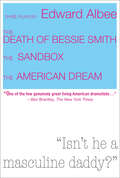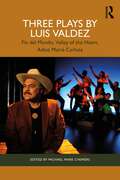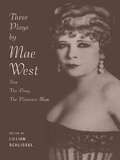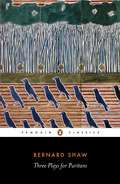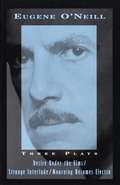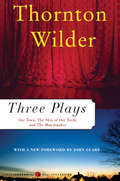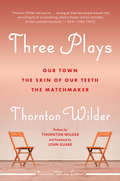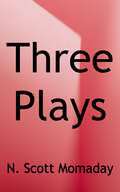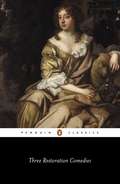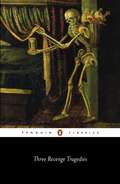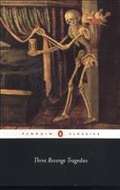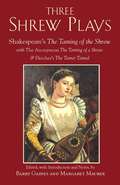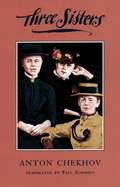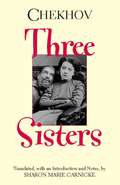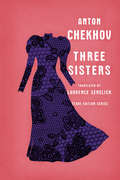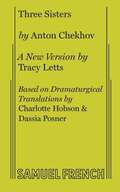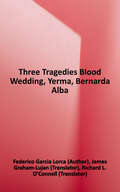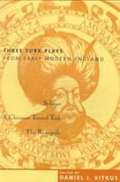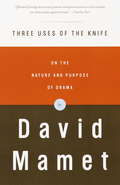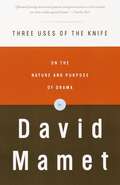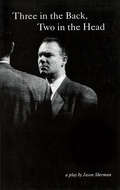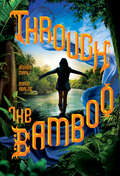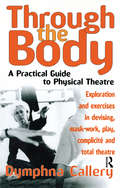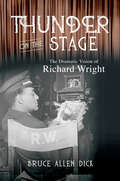- Table View
- List View
Three Plays by Edward Albee: The Death of Bessie Smith, The Sandbox, The American Dream
by Edward AlbeeThree acclaimed one-act plays from the early years of the author of Who&’s Afraid of Virginia Woolf?. With the initial productions of The Death of Bessie Smith, The Sandbox, and The American Dream, Albee consolidated his reputation as a brilliant new talent of the New York theater scene. These three plays tackle major themes such as race relations, American family life, and the essence of theater itself—each of which still continue to resonate. Representing the bold and exciting periods in the then-young career of widely considered America&’s most popular and imaginative playwrights, this edition is a must-have for theater lovers.&“One of the few genuinely great living American dramatists.&” —Ben Brantley, The New York Times
Three Plays by Luis Valdez: Fin del Mundo, Valley of the Heart, Adíos Mamá Carlota
by Luis ValdezCollecting together Fin del Mundo, Valley of the Heart, and Adíos Mamá Carlota, this book compiles the latest plays of Luis Valdez and explores how they stand to be considered masterpieces by the man who brought the world Zoot Suit and La Bamba.Luis Valdez has been described as the “last of the great American playwrights,” referring to a Golden Age of U.S. playwriting that began with Eugene O’Neill and included Tennessee Williams, Arthur Miller, and August Wilson. Like these other playwrights, Valdez’s impact on theatre needs to be measured on a global scale. The plays are psychologically deep, with powerful political messages woven into sophisticated plots and minutely drawn characters, all done with the characteristic rasquachi theatricality that made Valdez a household name. Fin del Mundo follows the protagonist through a maze-like urban afterlife that is by turns hilarious and deeply moving. In Valley of the Heart we witness a fictionalization of the true history of the relationship of Chicanos to Japanese-Americans during the horrific internments of World War II. Finally, in Adíos Mamá Carlota, we share the final moments of the former Empress of Mexico, teetering on the edge of madness, as she relives her extraordinary life and faces crippling guilt over her actions. Together, these plays represent a crowning achievement in the storied life of Luis Valdez. In this collection, each play is preceded by an introductory chapter by Jorge A. Huerta with analysis of the play.This collection is a vital and indispensable text for practitioners and students, as well as scholars of contemporary theatre, American, and Chicano performance.
Three Plays by Mae West: Sex, The Drag and Pleasure Man
by Lillian SchlisseMae West, wise-cracking vaudeville performer, was one of the most controversial figures of her era. Rarely, however, do people think of Mae West as a writer. In Three Plays By Mae West, Lillian Schlissel brings this underexplored part of West's career to the fore by offering for the first time in book form, three of the plays West wrote in the 1920s--Sex (1926), The Drag (1927) and Pleasure Man (1928). With an insightful introduction by Schlissel, this book offers a unique look into to the life and early career of this legendary stage and screen actress.
Three Plays for Puritans
by George Bernard ShawShaw believed that theatre audiences of the 1890s deserved more than the hollow spectacle and sham he saw displayed on the London stage. But he also recognized that people wanted to be entertained while educated, and to see purpose mixed with pleasure. In these three plays of ideas, Shaw employed traditional dramatic forms - Victorian melodrama, the history play and the adventure story - to turn received wisdom upside down. Set during the American War of Independence, The Devil's Disciple exposes fake Puritanism and piety, while Caesar and Cleopatra, a cheeky riposte to Shakespeare, redefines heroism in the character of the ageing Roman leader. And in Captain Brassbound's Conversion, an expedition in Morocco is saved from disaster by a lady explorer's skilful manipulation of the truth.
Three Plays: Desire Under The Elms, Strange Interlude, Mourning Becomes Electra
by Eugene O'NeillWinner of the Nobel Prize<P><P> These three plays exemplify Eugene O'Neil's ability to explore the limits of the human predicament, even as he sounds the depths of his audiences' hearts.<P> Eugene O'Neill was born on October 16, 1888, in New York City. His father was James O'Neill, the famous dramatic actor; and during his early years O'Neill traveled much with his parents. In 1909 he went on a gold-prospecting expedition to South America; he later shipped as a seaman to Buenos Aires, worked at various occupations in the Argentine, and tended mules on a cattle steamer to South Africa. He returned to New York destitute, then worked briefly as a reporter on a newspaper in New London, Connecticut, at which point an attack of tuberculosis sent him for six months to a sanitarium. This event marked the turning point in his career, and shortly after, at the age of twenty-four, he began his first play. His major works include The Emperor Jones, 1920; The Hairy Ape, 1921; Desire Under the Elms, 1924; The Great God Brown, 1925; Strange Interlude, 1926, 1927; Mourning Becomes Electra, 1929, 1931; Ah, Wilderness, 1933; Days Without End, 1934; A Moon for the Misbegotten, 1945; The Iceman Cometh, 1946; and several plays produced posthumously, including Long Day's Journey into Night, A Touch of the Poet, and Hughie. Eugene O'Neill died in 1953.<P> Strange Interlude was a Pulitzer Prize winner
Three Plays: Our Town, The Matchmaker and The Skin of Our Teeth (Perennial Classics Ser.)
by Thornton WilderThe three plays - Our Town, The Skin of Our Teeth, and The Matchmaker - describe love, death, human follies and human endurance.
Three Plays: Our Town, The Matchmaker, and The Skin of Our Teeth (Perennial Classics Ser.)
by Thornton WilderFrom celebrated Pulitzer Prize-winning writer Thornton Wilder, three of the greatest plays in American literature together in one volume.This omnibus edition brings together Wilder’s three best-known plays: Our Town, The Skin of Our Teeth, and The Matchmaker. Includes a preface by the author, as well as a foreword by playwright John Guare.Our Town, Wilder's timeless Pulitzer Prize-winning look at love, death, and destiny, opened on Broadway in 1938 and continues to be celebrated and performed around the world.The Skin of our Teeth, Wilder's 1942 romp about human follies and human endurance starring the Antrobus family of Excelsior, New Jersey, earned Wilder his third Pulitzer Prize. The Matchmaker, Wilder's brilliant 1954 farce about money and love starring that irrepressible busybody Dolly Gallagher Levi. This play inspired the Broadway musical Hello, Dolly!
Three Plays: The Indolent Boys, Children of the Sun, and the Moon in Two Windows (Stories and Storytellers Series)
by N. Scott MomadayLong a leading figure in American literature, N. Scott Momaday is perhaps best known for his Pulitzer Prize-winning House Made of Dawn and his celebration of his Kiowa ancestry, The Way to Rainy Mountain. <p><p>Momaday has also made his mark in theater through two plays and a screenplay. Published here for the first time, they display his signature talent for interweaving oral and literary traditions. <p><p>The Indolent Boys recounts the 1891 tragedy of runaways from the Kiowa Boarding School who froze to death while trying to return to their families. The play explores the consequences, for Indian students and their white teachers, of the federal program to "kill the Indian and save the Man." <p><p>A joyous counterpoint to this tragedy, Children of the Sun is a short children's play that explains the people's relationship to the sun. <p><p>The Moon in Two Windows, a screenplay set in the early 1900s, centers on the children of defeated Indian tribes, who are forced into assimilation at Carlisle, Pennsylvania, where the U.S. government established the first off-reservation boarding school. <p><p>Belonging with the best of Momaday's classic writing, these plays are works of a mature craftsman that preserve the mythic and cultural tradition of unique tribal communities in the face of an increasingly homogeneous society.
Three Restoration Comedies
by William Congreve William Wycherley George EtheregeAfter the restoration of King Charles II to the British throne in 1660, dramatists experienced new freedom in an age that broke from the strict morality of puritan rule and in which elegance and wit became the chief virtues. Irreverent, licentious and cynical, the three plays collected here hold up a mirror to this dazzling era and satirize the gulf between appearances and reality. In Etherege's The Man of Mode (1676), the womanizing Dorimant meets his match when he falls in love with the unpretentious Harriet, while Wycherley's The Country Wife (c. 1675) depicts the rakish Horner who fakes impotence to fool trusting husbands into giving him easy access to their wives. And in Congreve's Love for Love (1695), the extravagant Valentine can only win his beloved Angelica if he loses his inheritance.
Three Revenge Tragedies
by John Webster Thomas Middleton Cyril TourneurFollowing the end of Queen Elizabeth's reign in the early seventeenth century, the new court of King James was beset by political instability and moral corruption. This atmosphere provided fertile ground for the dramatists of the age, whose plays explore the ways in which social decadence and the abuse of power breed resentment and lead inexorably to violence and bloody retribution. In Tourneur's The Revenger's Tragedy, the debauched son of an Italian Duke attempts to rape the virtuous Gloriana - a veiled reference to Elizabeth I. Webster's The White Devil depicts a sinister world of intrigue and murderous infidelity, while The Changeling, perhaps Middleton's supreme achievement, powerfully portrays a woman bringing about her own unwitting destruction. All three are masterpieces of brooding intensity, dominated by images of decay, disillusionment and death.
Three Revenge Tragedies: The Revenger's Tragedy; The White Devil; The Changeling (Penguin Classics)
by Middleton Gamini Salgado Webster TourneurFollowing the end of Queen Elizabeth's reign in the early seventeenth century, the new court of King James was beset by political instability and moral corruption. This atmosphere provided fertile ground for the dramatists of the age, whose plays explore the ways in which social decadence and the abuse of power breed resentment and lead inexorably to violence and bloody retribution. In Tourneur's The Revenger's Tragedy, the debauched son of an Italian Duke attempts to rape the virtuous Gloriana - a veiled reference to Elizabeth I. Webster's The White Devil depicts a sinister world of intrigue and murderous infidelity, while The Changeling, perhaps Middleton's supreme achievement, powerfully portrays a woman bringing about her own unwitting destruction. All three are masterpieces of brooding intensity, dominated by images of decay, disillusionment and death.
Three Shrew Plays: Shakespeare's The Taming of the Shrew; with The Anonymous The Taming of a Shrew, and Fletcher's The Tamer Tamed
by Barry Gaines Margaret MaurerUnusual among Shakespeare's plays in that it drew theatrical responses from the outset, The Taming of the Shrew continues to inspire adaptations and interpretations that respond to its fascinating, if provocative, representation of a husband's dominance of his wife.This annotated collection of three early modern English plays allows readers to explore the relationship between Shakespeare's Shrew and two closely related plays of the same genre, the earlier of which, the anonymous The Taming of a Shrew (whether inspired by Shakespeare's play or vice-versa), once enjoyed a level of popularity that likely surpassed that of Shakespeare's play.The editors' Introduction brilliantly illuminates points of comparison between the three, their larger themes included, and convincingly argues that Shakespeare's Shrew is seen all the more vividly when the anonymous A Shrew and Fletcher's table-turning The Tamer Tamed are waiting in the wings.
Three Sisters
by Anton Chekhov Paul SchmidtThis refreshingly clear and colloquial adaptation was the basis for the Wooster Group's acclaimed production Brace Up!
Three Sisters
by Anton Chekhov Sharon Marie CarnickeFirst published in her Chekhov: Four Plays and Three Jokes, Sharon Marie Carnicke's eye-opening translation of Three Sisters appears in this edition with a new Introduction that expands upon her discussion in Four Plays & Three Jokes of Chekov's innovative dramaturgy--especially as seen in this subtle melodrama turned inside out.
Three Sisters
by Anton Chekhov Laurence Senelick"Senelick's accomplishment is astounding."--Library Journal Anton Chekhov is a unique force in modern drama, his works cherished for their brilliant wit and insight into the human condition. In this stunning new translation of one of Chekhov's most popular and beloved plays, Laurence Senelick presents a fresh perspective on the master playwright and his groundbreaking dramas. He brings this timeless trial of art and love to life as memorable characters have clashing desires and lose balance in the shifting eruptions of society and a modernizing Russia. Supplementing the play is an account of Chekhov's life; a note on the translation; an introduction to the work; and variant lines, often removed due to government censorship, which illuminate the context in which they were written. This edition is the perfect guide to enriching our understanding of this great dramatist or to staging a production.
Three Sisters
by Tracy Letts Anton ChekovThe Prozorov sisters pine for Moscow. Culture and life brim in the city center, while they live among the mundane of a crumbling army garrison after their father's death. Though living with their brother Andrey, nothing keeps them back but their own misfortune, decisions, and the inertia of negativity that continues to follow this family.
Three Tall Women
by Edward AlbeeAlbee’s frank dialogue about everything from incontinence to infidelity portrays aging without sentimentality. His scenes are charged with wit, pain, and laughter, and his observations tell us about forgiveness, reconciliation, and our own fates. But it is his probing portrait of the three women that reveals Albee’s genius.
Three Tragedies: Blood Wedding, Yerma, Bernarda Alba
by Federico Garcia LorcaHere in the authorized translation by James Graham-Luján and Richard L. O’Connell, with an illuminating biographical introduction by the poet’s brother, Francisco García Lorca, are three tragic dramas by the great modern Spanish poet and playwright which have caught the imagination and won the critical acclaim of the literate world. <p><p>Blood Wedding. Concerned with love that cannot become marriage among the primitive hill people of Castile, this is a play of the workings of tremendous passions and tribal ritual toward an inescapable tragic end. Yerma. "The whole tragic burden of Yerma is measured by the deepening of her struggle with the problem of frustrated motherhood." -From García Lorca, by Edwin Honig. The House of Bernarda Alba. Again in "Women Who Love Moves to Tragedy," Bernarda Alba tells of the repression of five daughters by a domineering mother, of how their natural spirits circumvent her but bring violence and death.
Three Turk Plays from Early Modern England: Selimus, A Christian Turned Turk, and The Renegado
by Robert Greene Daniel J. Vitkus Robert Daborne Philip MassingerDuring the sixteenth and seventeenth centuries, the Ottoman empire posed a clear and present danger to Christian rule in Europe. While English commerce with the Mediterranean world expanded, Ottoman forces invaded Greece, Hungary, and Austria. At the same time, "Turkish" pirates and renegades from North Africa roamed the Atlantic and raided the coast of England. The threat was ideological as well: English sailors captured by Barbary pirates sometimes renounced their faith and converted to Islam. Here, three important early modern "Turk" plays―Robert Greene's Selimus, Emperor of the Turks (1594); Robert Daborne's A Christian Turned Turk (1612); and Philip Massinger's The Renegado (1623)―are available for the first time. These texts represent Islamic power and wealth in scenes of piracy on the high seas, on-stage execution by strangulation, and rites of religious conversion. The plays are set in historical and cultural context by Daniel J. Vitkus's clear and thoughtful introduction. These carefully edited, annotated, modern-spelling editions are particularly valuable for understanding the cultural production of English identity in relation to the Islamic Other.
Three Uses of the Knife
by David MametThe purpose of theater, like magic like religion...ids to inspire cleansing awe. With bracing directness and aphoristic authority, one of our greatest living playwrights addresses the questions: What makes good drama? And why does drama matter in an age that is awash in information and entertainment? David Mamet believes that the tendency to dramatize is essential to human nature, that we create drama out of everything from today's weather to next year's elections. But the highest expression of this drive remains the theater. With a cultural range that encompasses Shakespeare, Bretcht, and Ibsen, Death of a Salesman and Bad Day at Black Rock, Mamet shows us how to distinguish true drama from its false variants. He considers the impossibly difficult progression between one act and the next and the mysterious function of the soliloquy. The result, in Three Uses of the Knife, is an electrifying treatise on the playwright's art that is also a strikingly original work of moral and aesthetic philosophy.
Three Uses of the Knife: On the Nature and Purpose of Drama
by David MametMamet unravels the infamous "Second-Act Problem," considers the mysterious persistence of the soliloquy. Three Uses of the Knife is an inspired guide for any playwright that doubles as a trenchant work of aesthetic philosophy.
Three in the Back, Two in the Head
by Jason ShermanThe issue of loyalty and betrayal is dramatized through dialogue in the Governor-General's-Award-winning Three in the Back, Two in the Head, which appears to have been based on the assassination of Gerald Bull, the brilliant Canadian scientist who designed the first Star Wars system twenty years before Reagan announced his version. Bull ran afoul of the Pentagon and the CIA by his dealings with China, Chile, Yugoslavia, and Iraq. But Sherman's play is not a docudrama in any sense, for it merely uses some of the circumstances of the murdered scientist's career in order to concentrate on questions of personal and state morality as these circumscribe issues of loyalty and betrayal.
Through the Bamboo
by Andrea Mapili Byron AbalosTwelve-year-old Philly is literally pulled into an action-packed adventure while mourning the loss of her lola when she opens an old book and finds herself tossed into the fantastical land of Uwi. In Uwi, memories are stories, and all stories are forbidden since the datu’s storytelling-loving wife died and his youngest daughter Nale disappeared. Now his remaining daughters, the Sisters, rule with darkness in their hearts. So when Philly appears, the duwende believe that she is Nale and the key to saving Uwi. Can Philly save them all while searching for her lola to bring her back home? Similar to The Wizard of Oz, the Chronicles of Narnia, and Alice in Wonderland, this unique Filipinx-Canadian tale inspired by Philippine mythology shows the value of keeping memories alive and explores how families deal with loss.
Through the Body: A Practical Guide to Physical Theatre
by Dymphna CalleryIn Through the Body, Dymphna Callery introduces the reader to the principles behind the work of key practitioners of 20th-century theater including Artaud, Grotowski, Brook and Lecoq. She offers exercises that turn their theories into practice and explore their principles in action.
Thunder on the Stage: The Dramatic Vision of Richard Wright
by Bruce Allen DickRichard Wright’s dramatic imagination guided the creation of his masterpieces Native Son and Black Boy and helped shape Wright’s long-overlooked writing for theater and other performative mediums. Drawing on decades of research and interviews with Wright’s family and Wright scholars, Bruce Allen Dick uncovers the theatrical influence on Wright’s oeuvre--from his 1930s boxing journalism to his unpublished one-acts on returning Black GIs in WWII to his unproduced pageant honoring Vladimir Lenin. Wright maintained rewarding associations with playwrights, writers, and actors such as Langston Hughes, Theodore Ward, Paul Robeson, and Lillian Hellman, and took particular inspiration from French literary figures like Jean-Paul Sartre. Dick’s analysis also illuminates Wright’s direct involvement with theater and film, including the performative aspects of his travel writings; the Orson Welles-directed Native Son on Broadway; his acting debut in Native Son’s first film version; and his play “Daddy Goodness,” a satire of religious charlatans like Father Divine, in the 1930s. Bold and original, Thunder on the Stage offers a groundbreaking reinterpretation of a major American writer.
